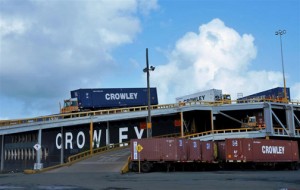Crowley modifies fee, sparing consumers from potential ‘domino effect’ on cost of goods

Following a series of meetings with private trade groups, customers and government officials, maritime shipping company Crowley Puerto Rico Inc. agreed to modify and push back the implementation of a new “Chassis Usage Charge” that could have potentially meant an increase in prices for consumer goods transported to the island.
Effective March 1, 2013, free time for chassis usage in Puerto Rico will mirror the present 10-day free time that it will hold containers as described in the respective service contracts in place, Crowley said. After the established grace period, a charge of $15 per day for use of the chassis will apply in addition to the existing daily demurrage rates, the shipping company said.
“In this way any customer that uses the Crowley-provided equipment in an efficient manner will not be impacted, yet the cost of misusing this distinct and separate piece of equipment will be recognized,” Crowley officials said in a statement. “We appreciate the feedback we received and look forward to working together with our customers on this and future matters.”
In December 2012, Crowley, as well as several of the other maritime cargo companies that transport goods to Puerto Rico, announced the looming hike, prompting major local companies and trade groups to raise a flag warning about the potential domino effect the increase could have on prices.
Crowley handles 20 percent of the maritime cargo that arrives to San Juan.
Late last week, Puerto Rico Manufacturers Association President Waleska Rivera praised Crowley’s decision, saying they “recognized the impact their decision would have on our economic development.”
“We urge other shipping companies to follow Crowley’s example and support the industry and Puerto Rico’s economy,” she said.
Meanwhile, Ports Authority Executive Director-designate Víctor Suárez — who met with Crowley’s high-ranking local executives last week as well — also reacted positively to the carrier’s decision, but said there is work ahead with regards to the other companies that have imposed a similar charge.
“I’m pleased that the meetings to address this issue paid off. During the next week I will be meeting with other shipping companies to try to have the charge removed,” Suárez said. “At Ports we’re seeking viable alternatives to eliminate this economic burden that ultimately our people will end up paying,”
Sea Star Lines and Horizon Lines have already implemented the charge, while Trailer Bridge has yet to make a determination.













